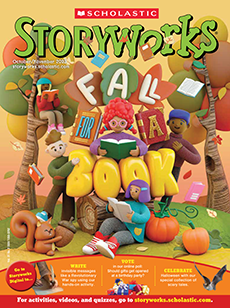JOHN CORBITT
Dear Leah,
Can you believe we found $100 on the sidewalk in front of our school? We’re so lucky! We should definitely keep it. It’s not like we’re snatching $100 out of someone’s wallet. We have no idea who dropped this money. We don’t know if that person is looking for it, or if he or she even realizes that it’s gone.
Of course we would return it if we knew who dropped it. But how would we find the right person? We can’t just put up signs around the neighborhood saying “Found, $100.” Anybody could say it was theirs. How would we know if they were telling the truth?
Besides, no one is going to judge us. In fact, plenty of people in our position would keep the money. According to a 2017 Scholastic survey of 376 middle schoolers, nearly half said they would keep money they found on the ground. Are all those kids horrible human beings? No!
Here’s an idea. We won’t buy something for ourselves. We’ll buy presents for our parents or our teacher with the money. We’ll use the money to make someone else feel good. So, what do you say?
Your friend,
Jack
Querida Leah,
¿Puedes creer que encontramos $100 en la acera al frente de nuestra escuela? ¡Qué suerte! Definitivamente deberíamos quedárnoslo. No es como que le estamos arrebatando $100 a alguien de su billetera. No tenemos idea quién dejó caer este dinero. No sabemos si esa persona lo está buscando, o si él o ella tan siquiera se da cuenta que lo perdió.
Por supuesto que lo devolveríamos si supiéramos quién lo dejó caer. Pero, ¿cómo podríamos encontrar a la persona correcta? No podemos simplemente colocar carteles alrededor del vecindario diciendo “Encontramos $100”. Cualquiera podría decir que es de ellos. ¿Cómo sabríamos si estaban diciendo la verdad?
Además, nadie nos va a juzgar. De hecho, mucha gente en nuestra posición se quedaría con el dinero.
Según una encuesta de Scholastic del 2017 de 376 estudiantes de intermedia, casi la mitad dijo que se quedaría con el dinero encontrado en el suelo. ¿Acaso todos esos niños son seres humanos horribles? ¡No!
Aquí tienes una idea. No compraremos algo para nosotros. Con el dinero compraremos regalos para nuestros padres o nuestra maestra. Usaremos el dinero para hacer sentir bien a otros. Así que, ¿qué dices?
Tu amigo,
Jack

